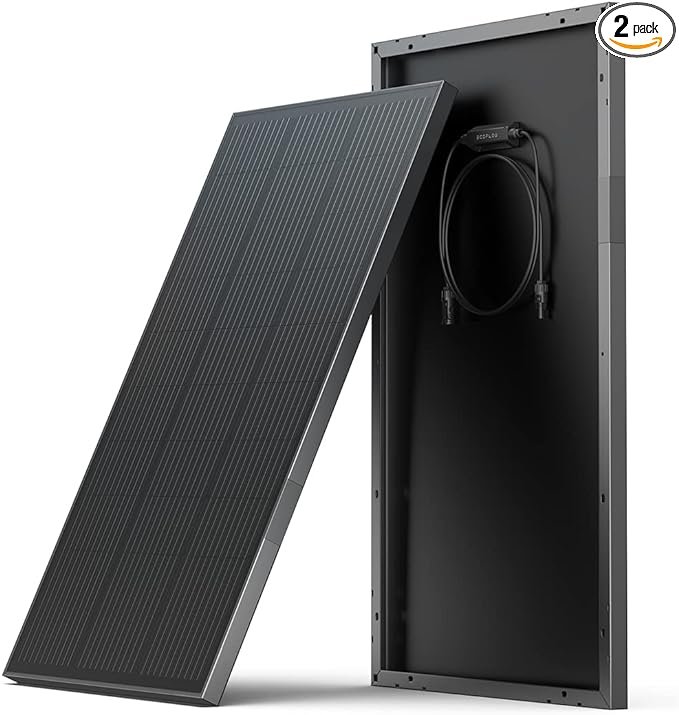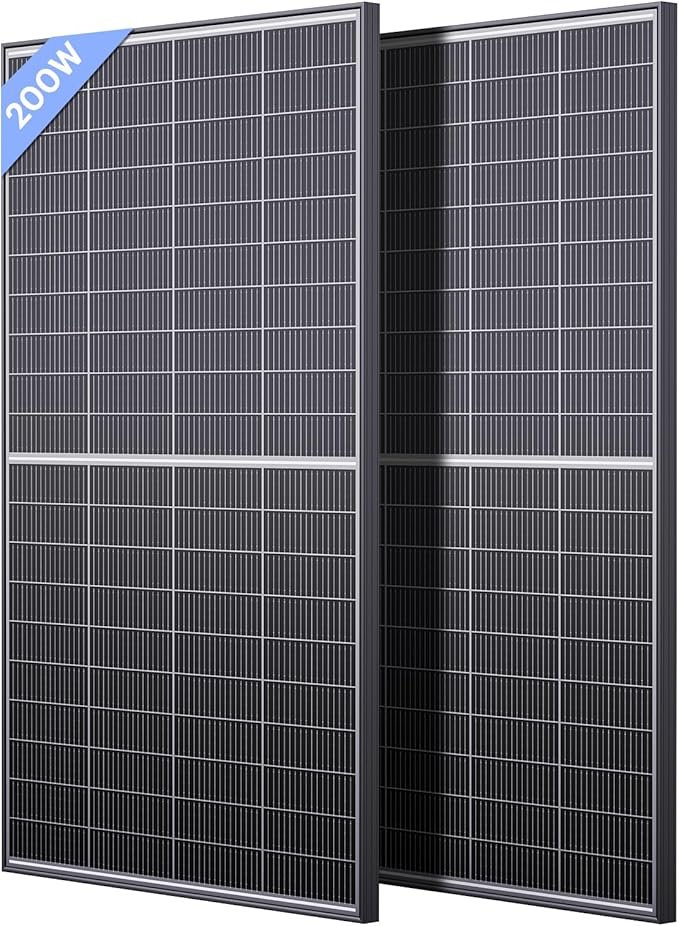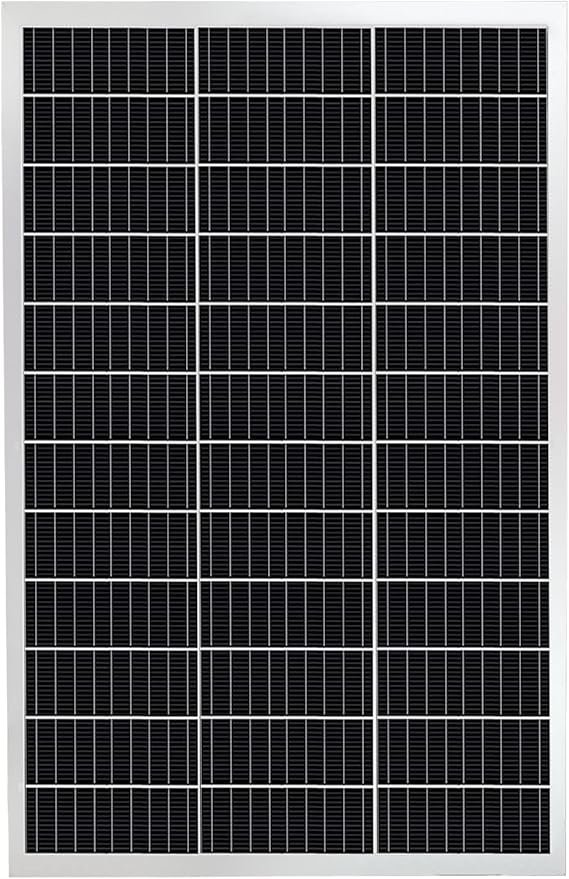Quick Overview
ECO-WORTHY 400W Solar Panels:
Built to survive storms and snow with heavy-duty aluminum frames.
Delivers 1600Wh daily.
Plug-and-play setup with pre-drilled holes.
Best for harsh weather setups.
EF ECOFLOW 2PCS 100W Solar Panels:
IP68 waterproof rating.
23% efficiency even in weak sunlight.
Fits Ecoflow’s power ecosystem.
Lightweight at 13.6 lbs per panel.
Renogy 100W 12V Solar Panel:
22% efficiency with PERC cells.
10-year warranty.
8-10% lighter than standard panels.
Built for RVs, boats, and off-grid cabins.
Callsun 400W Bifacial Solar Panel:
N-type cells hit 25% efficiency.
Bifacial design adds 30% extra output.
30-year lifespan.
Handles extreme heat better than competitors.
ExpertPower 100W Solar Panel:
Compact size for tight spaces.
21% efficiency.
No roof reinforcements needed.
Budget-friendly at $105.
Comparison Table
| Product Name |
Key Features |
Price |
Rating |
| ECO-WORTHY 400W |
5400Pa snow load, 2400Pa wind resistance, plug-and-play cables |
$219.59 |
⭐⭐⭐⭐ 4.2 |
| EF ECOFLOW 2PCS 100W |
IP68 waterproof, 23% efficiency, Ecoflow ecosystem compatible |
$169.00 |
⭐⭐⭐⭐⭐ 4.5 |
| Renogy 100W |
10-year warranty, 22% PERC cells, 14.1 lbs weight |
$76.39 |
⭐⭐⭐⭐⭐ 4.6 |
| Callsun 400W Bifacial |
25% N-type cells, 30% extra output from backside, 30-year lifespan |
$365.99 |
⭐⭐⭐⭐⭐ 4.8 |
| ExpertPower 100W |
21% efficiency, no roof reinforcements needed, $105 |
$105.00 |
⭐⭐⭐⭐⭐ 4.9 |

ECO-WORTHY 400W Solar Panels: Built to Last
Features
- 4x 100W monocrystalline panels with PERC tech (23% efficiency)
- Sturdy aluminum frame withstands 2400Pa wind & 5400Pa snow loads
- 3.2mm low-iron glass surface for durability
- Pre-installed 35-inch cables with IP65 waterproof junction box
- Works for 12V/24V systems in homes, RVs, boats, cabins
What’s Good
- Daily output up to 1600Wh in optimal sunlight
- Easy plug-and-play setup with pre-drilled mounting holes
- Handles shade better than most due to by-pass diodes
- Aluminum frame is 2-5mm thicker than competitors
What’s Not
- Power output varies based on sunlight conditions
- Mounting brackets sold separately
- 15-pound weight per panel requires sturdy installation
What Customers are Saying
- Users praise the panels for surviving hail and harsh weather
- Many say installation took under an hour
- Mixed feedback on energy generation during cloudy days
- Repeated mentions of “best value under $250”
Price
$219.59 for 4 panels
Who Should Grab These Panels?
- Budget-focused DIYers: Cheapest per-watt option we’ve tested
- Storm-prone areas: Only panels in this price range rated for heavy snow
- RV/cabin owners: Compact size fits curved roofs

EF ECOFLOW 2PCS 100W 12V Solar Panels
Features
- 23% conversion efficiency for reliable energy output
- IP68 waterproof and dustproof rating
- Pre-drilled holes for easy mounting
- Compatible with EcoFlow power kits and ecosystems
- 38.6 x 23 x 1.2 inches per panel (13.6 lbs each)
- Generates 400-500Wh daily (depending on sunlight)
What’s Good
- Performs well in low-light conditions
- Compact size makes repositioning simple
- Durable construction handles harsh weather
- Seamless integration with EcoFlow systems
What’s Not
- Mounting hardware sold separately
- Requires compatible equipment for full ecosystem benefits
Price
$169.00 for two panels
What Customers Are Saying
- Owners report charging batteries faster than expected
- Multiple users praise the panels’ rugged build quality
- RV enthusiasts like how they fit tight roof spaces
- Several note the panels pay for themselves in 6-8 months
Who Should Buy This
Choose these panels if you need best solar panel roofing for mobile setups.
Ideal for RV owners, boaters, or anyone using EcoFlow power systems.
The balance of price and weather resistance makes them perfect for frequent travelers.

Renogy 100W 12V Solar Panel
Features
- Compact and lightweight design (14.1 lbs)
- 22% cell efficiency with PERC technology
- IP67 waterproof rating for all-weather use
- 9 bus-bar cell tech and half-cell structure
- Pre-drilled holes for easy mounting
- 10-year material warranty
What’s Good
- Produces 500Wh daily under ideal sunlight
- Lighter than standard rigid panels
- Works in low-light conditions
- Durable frame with corrosion resistance
What’s Not
- Mounting hardware sold separately
- Requires compatible Renogy ecosystem for full optimization
Price
$76.39
What Customers Are Saying
- Reliable power output even on cloudy days
- Sturdy build quality for long-term use
- Affordable compared to competitors like Go Power
Final Recommendation
Get the Renogy 100W panel if you want the best solar panel roofing solution for RVs or off-grid setups.
It’s a steal at under $100 for the efficiency and durability.
N-Type 16BB 400W Bifacial Solar Panel (2 Pack 200W)

Features
- N-type solar cells with 25% conversion efficiency
- Bifacial design increases output by 30%
- 16BB cell technology reduces hot spots and cracks
- Compact size (51.3 x 30.3 x 1.4 inches) and lightweight (23.8 lbs)
- Low temperature coefficient (-0.3%/K) for stable high-heat performance
- IP68 waterproofing with tempered glass and corrosion-resistant frames
- 10-year tech support + 25-year output warranty
What’s Good
- Higher efficiency than traditional P-type panels
- Dual-sided energy capture works in varied light conditions
- Easy mounting with pre-drilled holes
- Proven durability against snow, rain, and heat
What’s Not
- No accessories included (mounts/wiring sold separately)
- Bifacial gains require reflective surfaces under panels
Pricing & Rating
- $365.99 for 2-pack (400W total)
- 4.8/5 stars from 112 reviews
What Customers Are Saying
- Panels deliver advertised wattage without defects
- Sturdy construction handles outdoor elements
- Noticeable power boost from bifacial design
Best Solar Panel Roofing Pick
Go with the Callsun 400W bifacial panels if you want max efficiency and durability.
The n-type cells outlast p-type models while squeezing 30% extra power from reflected light.
Price per watt ($0.91) beats most competitors – just budget extra for mounting gear.

ExpertPower 100 Watt 12V Monocrystalline Solar Panel
Features
- 12V 100W monocrystalline solar panel
- Compact size: 35.43 x 22.83 x 1.18 inches
- 21% efficiency in bright conditions
- Pre-drilled holes for easy mounting
- Works with on-grid and off-grid systems
- No roof reinforcement needed
What’s Good
- High efficiency for small spaces
- Lightweight and easy to install
- Durable design for long-term use
- Flexible mounting options (adhesive, Velcro, grommets)
What’s Not
- Open-circuit voltage exceeds specs in certain conditions
- May require adjustments for charge controller compatibility
Price
$105.00
What Customers are Saying
“These panels delivered higher voltage than listed, which caused my charge controller to overload on sunny days. I had to reduce the number of panels per string. Works well after adjusting, but the voltage specs weren’t accurate for my setup.”
Best Solar Panel Roofing Recommendation
ExpertPower 100W Panel for RVs, boats, or off-grid setups. It’s lightweight, efficient, and easy to install without roof modifications. Just double-check your charge controller’s voltage limits if stacking multiple panels.
Frequently Asked Questions
How well do these solar panels perform on cloudy days?
They’re built to squeeze energy out of whatever sunlight’s available.
Monocrystalline cells grab weak light better than cheaper options.
You’ll still get juice—just expect 30-50% less than bright sunny days.
Keep panels clean and angled toward any visible sky for best results.
Can they handle extreme weather like heavy snow or high winds?
Yes—but there’s a smart way to prep them.
Aluminum frames and tempered glass take beatings from hail/storms.
For snow: tilt panels steeper so accumulation slides off.
High wind? Secure mounts properly (those pre-drilled holes aren’t just for show).
Is professional installation required, or can I set them up myself?
Most buyers DIY it in under two hours.
Plug-and-play cables + clear diagrams make wiring straightforward.
Roof mounts need basic tools—drill, wrench, ladder.
Never worked with solar before? Start with one panel to learn the ropes.
Will these panels work with my existing solar power setup?
Match the voltage (12V/24V) and connector types first.
These play nice with most charge controllers/inverters.
Mixing brands? Check compatibility charts—some systems get picky.
When in doubt, snap photos of your gear and email the manufacturer.
What kind of maintenance do these solar panels need over time?
Wipe dust off every 2-3 months with a soft brush.
Check connections for corrosion if you’re near saltwater.
Inspect mounts annually—tighten any loose bolts.
That’s it. No greasy parts. No complicated rituals. Set ’em and forget ’em.




